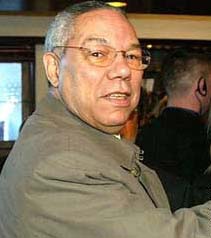| "I will bring a message of American determination
to work with the international community to deal with the most important
threat, the threat presented by Saddam Hussein and his weapons of mass
destruction," he said.
"We cannot now start shrinking because
the going is getting tough. The burden is on Iraq, Iraq must comply or
it will be made to comply by military force."
Despite recent wavering from some European
countries, Powell said the United States has the support of at least a
dozen unnamed countries, "with or without" another U.N. resolution approving
a military strike on Iraq.
"I don't want to give names or give you
a count, because I think each country should speak for itself on a matter
as important as this," Powell said, en route to Davos. "So we would not
be alone, that's for sure. I could rattle off at least a dozen off memory
and I think there will be more."
He said the 12 unnamed countries would
prefer a second U.N. resolution but "without that other resolution, they
will be with us."
Powell also said the United States would
wait for inspectors to give their report to the Security Council before
making any decision on what to do next. However, he told the Financial
Times Saturday that allowing more time for inspections would still not
yield better results.
The White House has not set a cutoff date
for U.N. weapons inspections in Iraq, but the United States will not tolerate
inspections that continue for months on end, senior administration officials
said Friday. (Full story)
"There are steps that we plan to go through,
methodically, deliberately," Powell said. "There will be ultimately an
end, I believe, to the patience of the international community."
He said the case against Iraq would be
laid out over the next few days, including the weapons inspectors' report
due Monday, U.S. President Bush's State of the Union address Tuesday, Wednesday's
U.N. Security Council meeting, and British Prime Minister Tony Blair's
visit to Camp David Friday.
"You'll see more of the case being laid
out and repeated so that people understand it," he said.
But in a sign that the row between Washington
and key European allies continues, French President Jacques Chirac and
his Russian counterpart, Vladimir Putin, agreed during a telephone conversation
Friday that their positions on the Iraq crisis were similar.
Both France and Russia have set themselves
against the U.S. position by holding out against going to war with Iraq
too hastily. During the conversation the two leaders agreed that "the positions
of France and Russia were very close," Chirac's spokeswoman, Catherine
Colonna told Reuters.
Chirac said the inspectors must finish
their job, a position at odds with that of Bush, who has grown increasingly
impatient with the inspection process.
On Friday the EU's foreign policy chief
Javier Solana said in Athens that a rift between Washington and leading
European nations over Iraq would be a "very negative thing."
"I think we have to cool off a little bit,"
he told reporters. "We have a very profound friendship with the United
States and we have to do the utmost to maintain this relationship," he
said.
His comments followed anger in Germany
and France over an accusation by U.S. Defense Secretary Donald Rumsfeld
that they represented "old Europe" and were isolated in their opposition
to war with Iraq. (Full story)
German Chancellor Gerhard Schroeder also
sought to calm the dispute, saying the two continents were built on the
same values.
"I want to keep the debate factual and
I don't want to take part in polemic disputes," Schroeder said in an interview
with RTL television for broadcast Friday.

|
